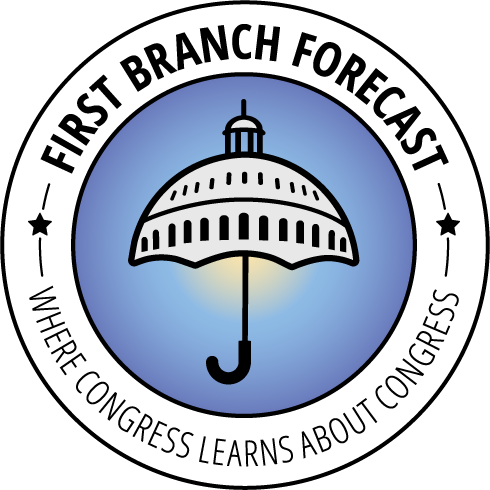Welcome to the First Branch Forecast, your weekly look into the Legislative branch and government transparency. (Tell your friends to subscribe.)
TOP LINE
White nationalism has no place in Congress and yet several representatives on Friday were gathering support to start the America First Caucus, ostensibly focused on Anglo-Saxon “political traditions,” per PunchBowl.news. The America First Committee, the obvious antecedent, was formed in 1940 to keep the U.S. from intervening in WWII against the Nazis and was led by the most prominent anti-semites of the day. In recent times, America First has been invoked by Pat Buchanan and Donald Trump. You don’t need German shepherd ears to hear this fascist dog whistle.
But you have to work very hard to avoid connecting the dots from the Trump administration to election rejection to the Trump insurrection to this caucus. Will Republican leaders continue their deal with the devil in hopes of regaining political control? The clearest signals so far are the continued caucusing of America First representatives with the Republican party and voter-suppression legislation across the country. It’s not like we do not know how to fix the minority-rule doom loop just like we already know who is digging the grave of our democracy.
A commission proposal aimed at nailing down the “scope, composition, and resources necessary to seek and find the truth” of the euphemistically-described “January 6th” events is being re-sent to Republicans by Speaker Pelosi. Just as before, there will not be any takers to do anything meaningful — Sen. McConnell will reject this proposal as he rejected the previous one, by calling it partisan. That’s a neat trick: by definition a proposal is partisan unless Sen. McConnell says otherwise, even though rejection does not negate its wisdom. Calls for bipartisanship to fix our broken politics in a two-party system where one party’s leadership by-and-large rejects fundamental democratic principles is a fools’ errand beloved by editorial page writers, cable news bookers, and reputation launderers. Either pro-democracy Republicans must retake their party, which is increasingly unlikely, or they must follow Rep. Amash’s example and start anew. “A house divided against itself cannot stand.”
America has a long history of one-party rule at the state level. At the federal level, one-party rule has been manifested as a minority veto — the modern incarnation of nullification. Nullification is the mid-19th century political theory advanced by Sen. Calhoun that held a state could invalidate federal laws it did not like, and southern states did not like restrictions on slavery and the implications for their wealth derivered therefrom. Here’s how Sen. McConnell has described the modern incarnation of nullification, the filibuster: “So while Yarmuth calls the filibuster a ‘minority veto’, it’s really ‘Kentucky’s veto….’ It protects Jeffersontown and Shively from being steamrolled by Brooklyn and San Francisco. Last year, the voters rehired me to use Kentucky’s veto and protect our values.” We must ask: whose veto, Sen. McConnell? Which values? For what cause?
All is not lost, at least not yet. A handful of Republicans voted to impeach Pres. Trump and a third of the party stood for upholding the election results. Many more are privately horrified by what is happening but are unwilling to risk their positions. We are rapidly passing the point where only a political career is at stake. Only luck and happenstance prevented the Trump insurrection from decapitating Congress and murdering the Constitutional line of succession. We know what is necessary to save our democracy and we know the people who are standing athwart progress, yelling stop. It is not America they are putting first, but themselves.
WHAT’S NEW
The US Capitol Police Inspector General testified & released two reports on the insurrection, focused on inadequate planning, failures of intelligence, and a dysfunctional civil disturbance unit. Notably the USCP IG does not have jurisdiction over the Capitol Police Board.
A committee funding resolution was reported by House Admin, with an average 5% increase that leaves committees still almost 20% below their levels from a decade ago
The Select Committee on the Modernization of Congress held a Member day hearing
The Senate Legislative branch appropriations committee has its first hearing scheduled this week, with testimony expected from USCP Acting Chief Pittman, AOC Blanton, and the new Sergeant at Arms
Deadlines for written testimony for House Legislative branch appropriations were announced and Member witness days are beginning to be announced. Notably, House appropriators are not inviting the public to testify “in person” this year.
A joint report on the Trump insurrection at the Capitol from HSGAC and Senate Rules is expected in the coming weeks.
The timing of the Security Appropriations Supplemental is unclear despite prior reporting. In fact, I’ve begun to distrust the vast majority of reporting on its size and contents and timing. The only report that makes sense is a lack of communication between the chambers. As you know, Demand Progress has recommendations for what should be in the supplemental.
House Admin’s activity report for the 116th Congressis out. It contains a lot of new and unreported information, from COVID adaptations and security reviews to new franking regulations. Admin has oversight of the Capitol Police, and its report provides insight on their activities to reform the USCP before it became a high profile issue.
The Advisory Committee on Transparency is hosting a webinar on Star Wars day, next Tuesday, May 4th, on Transparency in the 117th Congress. The webinar will provide an overview of transparency in the federal government, with a focus on where Congress likely will concentrate its attention and the status of past legislative efforts. Panelists include the Project On Government Overight’s Liz Hempowicz and yours truly, with GovExec’s Courtney Buble moderating and an additional panelists TBA. RSVP here.
Continue reading “Forecast for April 19, 2021” →


